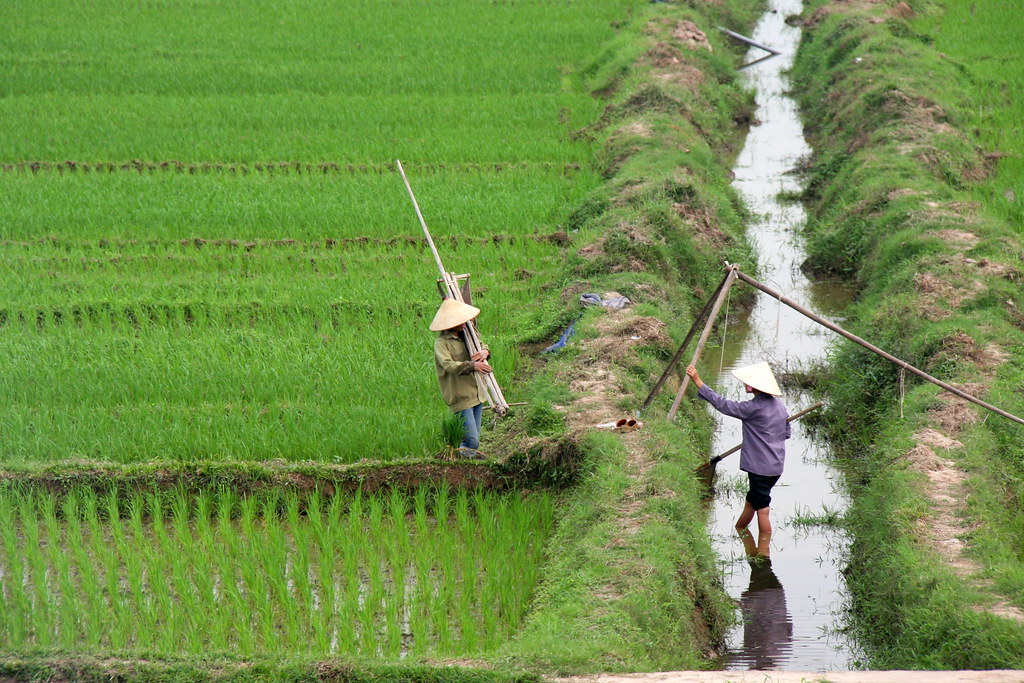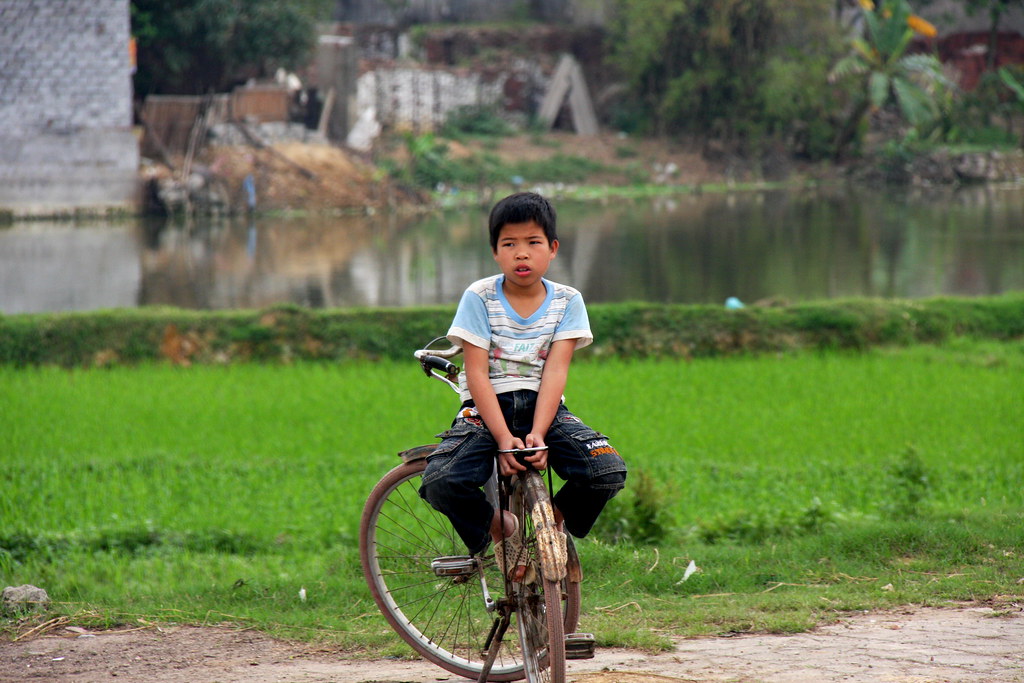


An exerpt from my journal during my Semester at Sea.
March 23, 2009 – Ha Long Bay, Vietnam
We were on our way to Hanoi, the nation’s capital, where we would then depart on our three hour bus ride to Ha Long Bay through bright emerald rice fields dotted with men and women in their pointed brown, woven hats and loose pants and button down shirts, bent over as they pulled the fine grains of rice from the grass. Interspersed in the fields were old, grey tombstones, in either large plots of about 100 gravestones or just a few side by side. Our tour guide said that they bury the dead wherever they have land. I found it quite odd though that they buried their dead in the midst of the rice fields, but the more we drove, the more tombs I saw tucked into the lime green grass that produced the nation’s largest food supply. There were chocolate colored cows grazing contentedly on the nutritious green expanse and old wooden wheelbarrows and dusty bicycles resting in the dirt paths between the fields. Along the back of the fields were tall, narrow, brightly colored houses all piled on top of each other, one after the next, with big bay windows looking out onto the fields and balconies with freshly cleaned shirts and pants hanging to dry on clotheslines that hung diagonally across them.
After driving for about an hour, our tour guide told us that we would be stopping at a neighborhood market. I was very excited to get away from the tourist attractions and interact with the local people.
So we filed out of the bus and entered a narrow alley way, passing by dirty motorbikes, old wheelbarrows, grimy bicycles and people busily at work transporting fruits and building materials into town. The people here were so friendly and curious about these strange white people coming into their market, which consisted mostly of Vietnamese women wearing old clothes, pointed rice paddy hats and brightly patterned doctor’s masks over their mouths to protect them from the extreme pollution that filled the air. Along the alley, some women were sorting oranges onto old crumpled up newspapers and others were sorting brown, rotting lettuce into more appealing piles. Then we took a right into this large space between the tall buildings that lined the road, exposing a massive market comprised of wooden sticks tied together with string, covered in brightly colored tarps which acted as roofs to protect the women from the harsh sun. There were stacks of crates and old boxes teetering on top of one another and bicycles leaned up against the backs of stalls, and women surrounded by chunks of striated and smooth red meat as they swatted away the hungry black flies that attacked the raw meat. Others were selling mounds of green herbs and bushels of ripening bananas, while others were selling green onions and white cloves of fresh garlic which laid on dirty beige tarps on the ground. But something that I noticed as I was walking through these markets with a big smile on my face was how friendly and welcoming these women were. They did not feel that we were invading their territory, but instead they welcomed us with their friendly, crooked smiles and when I waved to them, they excitedly waved back. It was an amazing experience to bond with these women using only my smile and a wave of my hand. But it worked and may have been one of the more powerful connections I have felt throughout this voyage. It’s incredible to realize that language can be such a large, isolating barrier between people, but it can also be overcome with simple gestures that everyone shares, no matter what country they come from or what language they speak.
I returned to the bus with a warm feeling in my chest, happy to have shared an experience with these accepting and kind Vietnamese women who seemed to focus more on our similarities than our differences. Little did I know this temporary good feeling would soon be replaced with feelings of horror and shame. We continued for a while longer until we reached our next stop, an Agent Orange rehabilitation center on the side of the highway that sold paintings, silk scarves, traditional Vietnamese costumes, jade jewelry and carved sculptures that were crafted by the victims of Agent Orange. It was a very moving experience to see these men and women that had been so badly debilitated by this toxic chemical that my own country had inflicted upon them. The Americans dropped 72 million liters of Agent Orange in the Vietnam War, over fields and forests to clear the foliage to better see the soldiers’ pathways. We learned that four million Vietnamese people were affected by Agent Orange via birth defects, physical deformation and mental retardation. Watching the kind man at the desk writing out receipts with a pen tied to the end of the stump on his right arm where his hand should have been and a half closed eye lid which covered his lazy eye brought with it a wave of guilt for what my country had done. It was an incredibly moving and sad experience. I also saw another man walking from the warehouse to the courtyard, completely hunched over, with his back looking like an upside “U” so that his head was only about a foot above the ground. It was absolutely heart breaking. And it is strange to think that this happened over 30 years ago. It is something that I have rarely thought about, because I wasn’t alive when it happened and I have never once seen the repercussions of this war. But I began to realize that these innocent people’s lives have been drastically and negatively altered by my country. It doesn’t seem fair that I was never once directly affected by this war, and yet these people are affected by the war every single day of their lives, struggling to survive, never able to have a normal life – what a horrible thing war is. I was shocked that they could even look me in the eye. I felt so responsible for their awful circumstances that they were unfortunate enough to be born into, and yet they did not hold me responsible. They smiled at me kindly as they looked me in the eye, and I only saw forgiveness, and not the hostility or hatred I had been expecting. My friend Brad asked our tour guide at the end of the trip, “What is the most important thing that you want us to take away from our experience in Vietnam?” and the guide responded, with tears in his eyes, “that we are a forgiving and forgivable people.”

No comments:
Post a Comment